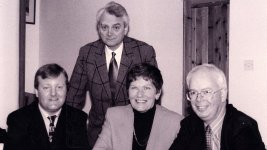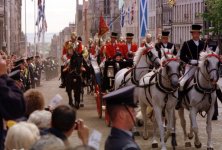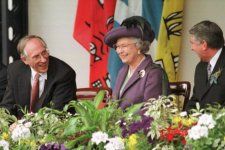Labour published its manifesto in Scotland with the party trailing the Alliance in the opinion polls. "There's three and a half weeks of hard fighting to go, but the momentum is with us now," Liberal defence secretary Russell Johnston claimed to
The Guardian. Prospective Labour spokesman Willie McKelvey hoped the launch in early May would counter the Alliance's advance. "We're on your side" came the party line to Scottish voters. Its manifesto concentrated on traditional 'bread and butter' issues; for example, improving social services and reforming the police force. Other measures included scrapping prescription charges for all and extra financial support for students. Labour were keen to focus the Scottish electorate's attention on domestic issues. Upon McKelvey's election to the leadership, his campaign made arguments for socialism, attacking the UK Government's coal plan, market values and the retention of Right to Buy. Meanwhile, the Alliance touted the advantages of devolution. Pointing to a list of achievements in Westminster, the Liberals savaged the Independent Unionists and SNP on nationalism, arguing that they both needed one another in an "unholy pact". The SDP hit out at Labour on the economy. Neil Kinnock labelled the SNP as "Tartan Tories".

Once all the devolved parties had chosen their leaders, the race became more policy-centred and less tribal. Tory representative Malcolm Rifkind announced his backing for the Scottish Parliament and launched his policies, chiefly government investment in private-sector firms. Shorn of its most regressive wing, the Conservative Party began morphing into a rather technocratic vehicle for moderate adjustments in the name of higher productivity and economic growth. Independent Unionists battled to abolish the new Parliament, a message that resonated with fringe elements beyond the mainstream of views. The SNP hoped to persuade more voters of the case for independence. National leader Gordon Wilson succeeded, however, in making the SNP's approach to constitutional change more gradualist. He argued that vast North Sea oil revenues "should be ploughed back into the industrial fabric of Scotland". Compared to her rivals it was the Alliance, led by Ray Michie (Liberal) and Donald Dewar (SDP), who deployed numerous familiar faces (e.g. Robert Maclennan, Charles Kennedy and David Steel himself) to reach undecided voters.

"It does, I hope, end much argument and dispute," ventured Mr Dewar on hearing the outcome, held under the Single Transferable Vote method in a ground-breaking event. The Alliance had sailed out ahead of its competitors, ending more or less tied in the vote share with Labour, though without a majority (as to be expected with proportional representation). 23 Liberal MSPs had been elected to the SDP's 13. David Owen claimed that "the era of big centralised government is over". The Prime Minister hailed it as a vindication of the Alliance's policy of devolution - and proof that most voters rejected separatism. "We have made it work and in Scotland it's absolutely clear that the vast majority of people voted for parties that are opposed to the nationalist agenda of independence," he said. Mr Wilson congratulated Michie and Dewar on their success but promised that the SNP would be a creative and dynamic alternative. Rifkind talked up the Tory result. "The Conservative and Unionist Party is back. We are going to be the third force in Scottish politics." McKelvey warned the Alliance would be forced to negotiate in order to form a coalition in the Scottish Parliament. Mrs Michie obliged: "We are going to have to make compromises - that's called democracy".

The Alliance and Labour were jubilant about their parties' gains, after many commentators had poured scorn on the Labour campaign and forecast a poor result. Scotland's first national poll did, however, confirm a relative decline in the party's fortunes north of the border, where they had once been hegemonic. Asked about coalition plans, Mr McKelvey said: "We are all minorities now... Scotland has waited 300 years for this Parliament; I think the voters have a bit more patience for two or three more days. We are not going to be rushed." Michie wept as she told ecstatic supporters that today was a fateful one. The well-liked Liberal leader was cheered by party members in Edinburgh. Her two main aims had been self-government and the development of Gaelic - "one of the oldest languages in Europe, so rich in literature, music, poetry and song, which has so enhanced our heritage, our culture, our traditions and values". She therefore delighted in the creation of her long fought-for Scottish Parliament. Michie spoke about "her people" and "her islands", not in a feudal, paternalistic way, but because she felt honoured and privileged that they had voted Alliance and, in turn, she wanted to do her best for them.






